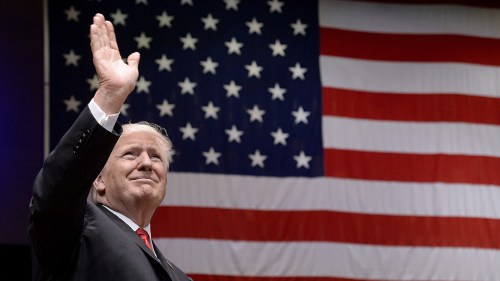These 3 states could decide the GOP presidential nominee
Voting starts in just a few weeks for the GOP’s 2024 presidential primary, and early-state results could significantly shape the crowded field and even solidify the Republican nominee for the White House.
Former President Trump remains the front-runner by a significant margin in most polling, while the rest of the party’s presidential hopefuls have been jostling for months to best each other and stand out as the strongest Trump challenger.
The first votes will be cast in January, less than two months away. Candidates have already been investing heavily in the early states, which are seen as key to staying competitive as the race heats up in 2024 — and could even determine the eventual winner of the Republican nomination.
The presidential contenders will meet on the GOP’s fourth debate stage in Tuscaloosa early next month, though Trump is set to skip the event. After that, eyes will turn to Iowa’s first-in-the-nation caucuses, which is followed closely by New Hampshire’s primary.
Here are some of the early states that could make or break Republican presidential campaigns:
Iowa
Iowa’s caucuses, slated for Jan. 15, are already in the spotlight as candidates look to one-up each other in the earliest bout of voting on the GOP’s presidential nominating calendar.
“In Iowa, I would pay very close attention to the margin between whoever finishes second, and whoever finishes third,” Iowa-based GOP strategist Jimmy Centers said.
Centers predicted Trump will comfortably win the Iowa contest but said that a big gap between second and third would be a signal that the field should consolidate to a two-person race before New Hampshire’s primary eight days later.
“With the field as it currently stands with the Trump alternate vote fractured between several different candidates, the math just simply doesn’t work for someone to beat former President Trump for the nomination,” Centers said.
Florida Gov. Ron DeSantis (R) has long been seen as the second-place contender behind Trump, but former United Nations Ambassador Nikki Haley has been rising in recent polling and appears to be making a final push to overtake DeSantis in the state.
In Iowa, DeSantis fell 3 points between August and November, while Haley climbed 10 points, according to a Des Moines Register/NBC News/Mediacom Iowa poll released in late October. They were tied for second at 16 percent — behind Trump’s 43 percent.
“Nikki Haley is the only candidate who is positioned to do well in both [the Iowa caucuses and New Hampshire primary],” Haley’s campaign manager said in a memo obtained by The Hill.
Team DeSantis said in its own memo that “this has always been and remains a two-person race in Iowa between Trump and DeSantis.” DeSantis notably has the coveted endorsement of Iowa Gov. Kim Reynolds (R), and his campaign has said it’s focused on denying Trump a “big win” in the state.
Some strategists think a loss in Iowa doesn’t necessarily spell disaster for any given candidate, with the other early state contests as additional opportunities to stand out. But others argue Iowa could be the last chance for either DeSantis or Haley to secure second place and stay in the game as the race against Trump heats up.
“If Trump wins both Iowa and New Hampshire, regardless of the margin of victory, this thing is over, period,” Republican strategist Brian Seitchik said.
On the other hand, if Trump loses either state, “the race is turned upside down,” and “we’re looking at the longest general election in modern American history” between President Biden and Trump as the clear picks of either party, Seitchik said.
Although Trump, Haley and DeSantis are top picks for a competitive showing in Iowa, Vivek Ramaswamy has also said he thinks his campaign has a “good shot at an outright victory, or something close to it” in the state, despite some concerns about his traction. Former New Jersey Gov. Chris Christie’s (R) team has said he’s ready for the long haul.
South Carolina Sen. Tim Scott (R) dropped out of the race earlier this month just after he’d announced a shift of his campaign focus from New Hampshire to go “all in” on Iowa.
New Hampshire
The Granite State went against a plan proposed by the Democratic National Committee (DNC) to shake up the party’s nominating calendar, and it announced earlier this month that it’ll hold the state’s presidential primaries on Jan. 23, a week after Iowa’s GOP caucuses.
“Iowa and New Hampshire both present really unique opportunities for the field to express itself and to find a way to make this a two-person race,” New Hampshire-based GOP strategist Jim Merrill said.
A CNN poll released last week found Trump in the lead with 42 percent among likely GOP primary voters in the Granite State, but Haley appeared to be gaining ground — scoring 20 percent support. DeSantis garnered just 9 percent.
Other recent New Hampshire polling has backed up Trump’s front-runner status in the state, but it also showed Haley on the rise to second.
“Trump’s in a strong spot, but he doesn’t have this sewn up yet. I think he still has to go out and earn it,” Merrill said.
Christie’s campaign has been homing in on New Hampshire after he said back in September that he would leave the 2024 race if he didn’t do well there. Back in 2016, he ended his first White House bid just after coming in sixth in the state’s contest.
And North Dakota Gov. Doug Burgum, who didn’t meet the GOP’s third debate stage criteria earlier this month, said in an op-ed defending his continued candidacy that he plans to push forward and “let the voters decide” in Iowa and New Hampshire.
Dante Scala, a professor of political science at the University of New Hampshire, stressed that “what works in Iowa may not work in New Hampshire,” and the same champion isn’t guaranteed to emerge from the two early states.
Sen. Ted Cruz (R-Texas) won the Iowa caucus back in 2016, beating out Trump — who went on to win New Hampshire’s primary and then eventually take the presidency.
The states have “very different” Republican electorates, Scala said, varying in their degrees of conservatism and the topics most important to them.
Speculation, assessments and attention are set to mount even further in the coming weeks ahead of “the climax of the preseason” with Iowa and New Hampshire, Scala said. “It all builds to, finally, the voters weighing in.”
South Carolina
Roughly a month after New Hampshire, the South Carolina GOP is set to hold its primary on Feb. 24.
Nevada’s GOP caucus falls on Feb. 8, but political observers highlight the Palmetto State’s first-in-the-South primary as the next key focus after the Hawkeye and Granite states.
Scala described South Carolina as “the center of gravity of these early contests,” contending that the state has “proved decisive in a way that Iowa and New Hampshire [have] not.”
“Depending on how these first two races shake out, South Carolina could be enormously impactful,” Merrill said.
The state could be particularly important for Haley, a former South Carolina governor, as she looks to surge to a strong second place.
Still, a CNN poll released last month found Trump with a sizeable lead over Haley among likely Republican primary voters in the state, with 53 percent support to the former governor’s 22 percent. DeSantis came in third with 11 percent.
“It’s not hard to come up with scenarios where either one of them could potentially benefit from South Carolina being first in the South,” Merrill said of DeSantis and Haley. But he noted that how they benefit from the Palmetto State “depends on them exceeding expectations” in Iowa and New Hampshire.
Political observers predict the race could be solidified as early as Super Tuesday or early March — and they stress that factors like the margins between candidates and how quickly the field winnows will be key to analyzing the results.
“The reality is, if President Trump puts up two wins in Iowa and New Hampshire … and if there isn’t a two-person race after New Hampshire, that’s a long slog until South Carolina without any other candidate putting up a win,” Centers said.
“Money’s going to start to run short. Voters are going to start to believe that this is becoming inevitable. And the primary, for all intents and purposes, could very well be over after the 23rd of January,” he said.
Copyright 2024 Nexstar Media Inc. All rights reserved. This material may not be published, broadcast, rewritten, or redistributed..













